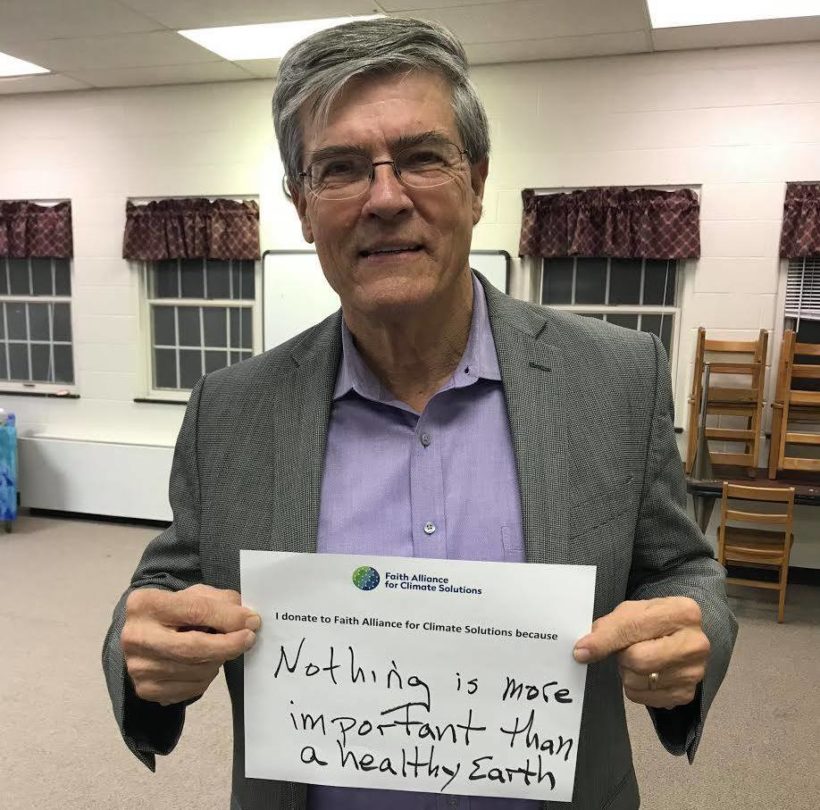 By ELIZABETH MCGOWAN
By ELIZABETH MCGOWAN
The nondenominational Faith Alliance for Climate Solutions has expanded to include 75 congregations and communities.
A small gathering of worshipers dispirited by the enormity of climate change huddled in a Fairfax County church basement almost eight years ago.
The robust, nondenominational group that emerged from those initial talks has been on the rise ever since.
Now 75 congregations and faith communities strong, the nonprofit Faith Alliance for Climate Solutions has become a formidable environmental force countywide as it has expanded on its original mission of greening churches, mosques and temples. Its specialty is hyperlocal climate campaigns.
“The name grounds us,” said Eric Goplerud, founder and board chair of the group, known as FACS. “It tells everybody that we’re an alliance and our focus is on solutions, not problems.”
Fairfax to Zero is his latest initiative. County supervisors and school board leaders have been so receptive to the alliance’s requests in the past two years that FACS was emboldened to up its ask this year. One priority is a blueprint that clearly defines a path to emissions neutrality by at least 2050. It includes renewable energy, net-zero buildings and electric vehicles.
“We have momentum and can’t fiddle around,” Goplerud said. “With the climate crisis, we don’t have a whole lot of time and we have a lot of work to do. Our question is always, ‘What are the levers we should be pulling?’”
Goplerud, a resident of Fairfax County since 1983, seems to have identified the right ones. The Unitarian Universalist transmits his passion about climate change as the ethical and moral issue of these times to the 2,400-plus members of FACS.
Volunteers not only show up at public meetings and marches, but leaders of 10 advocacy teams also lobby officials elected to the board of supervisors and the school board. Another team tracks state issues. Basically, FACS has crafted a sophisticated political party that deploys a precinct and district captain model.
“In our meetings, we are not Republicans, Democrats, liberals or libertarians, rather we are Catholics, Lutherans, Jews and Muslims from their districts,” Goplerud said about their nonconfrontational approach. “When our advocates sit down with a supervisor, that elected official sees 10,000 constituents, not just one group or club.”
In the last year alone, that personal approach played a role in nudging the county toward forming an Office of Environment and Energy Coordination and also allocating more than $6.5 million toward converting streetlights to more efficient LEDs and installing charging stations for electric vehicles. As well, FACS has a seat at the Joint Environmental Taskforce as the county government and schools make strides on solar energy, environmental education, and an energy and climate action plan.
The FACS-county relationship wasn’t always so rosy.
Early on, the nonprofit faulted the county government and schools for lagging behind other local jurisdictions in posting its energy use and emissions footprint on a website in an accessible format.
“We were seeking to make a unique contribution. Where could we have an impact?” Goplerud said about the 2.5-year push for answers. “What we thought was low-hanging fruit took so long and meant lots of advocacy time.”
The county followed the schools’ lead and began sharing energy and emissions data via its website in March 2016. The information spans from 2006 to 2017.
“That was our first win,” Goplerud said. “It got things going.”
Then, he was inspired to launch Fairfax to Zero because he thought the county had ossified on bold greenhouse gas emissions reductions promised more than a decade ago under the guidance Gerry Connolly, then the chair of the County Board of Supervisors.
Before Connolly, a Democrat, was elected to the U.S. House of Representatives in 2008, he had committed the Virginia county to join with Nassau County in New York and King County in Washington as leaders in launching Cool Counties. Broadly, the Cool Counties pledge called for reducing emissions 80% below 2005 levels by 2050. It was an outgrowth of a program called Cool Cities spearheaded by the Sierra Club.
Goplerud maintained that meant county emissions should have dropped 2% annually. He said he became a persona non grata for repeatedly taking county officials to task for falling woefully short.
Ali Althen, spokeswoman for the Office of Environment and Energy Coordination, countered that claim that Fairfax wasn’t measuring up to its Cool Counties responsibilities. “We are pleased to say that we are on track, with a 9% reduction in emissions between 2005 and 2015,” to meet the pledge goals despite a 13% increase in population, she said.
She noted that the reduction puts Fairfax in line with other counties in the region.
Living in a large, wealthy county that is a suburb of the nation’s capital means Goplerud’s group had access to an array of savvy professionals. For instance, five attorneys have offered their energy and environmental expertise.
Another participant is retiree Barbara Bacon, who leads the advocacy team that discusses the alliance’s agenda with Supervisor Dan Storck. She was a longtime editor at the National Academy of Sciences.
“It’s great fun and very satisfying,” Bacon said about splitting her time between FACS and the climate action team at Mount Vernon Unitarian Church. “This is not about being combative, it’s about being persuasive.”
Working with Storck is “not like pulling teeth” because he is receptive to the FACS message and the sole supervisor with an environmental advisory committee, she said.
“The beauty of working locally is that it is the most effective,” Bacon continued. “We have so much to change, and it is projects like this that will make a difference.”
Storck praised members of FACS as informed and easy to work with. In December, he nominated Goplerud for a volunteer and community service award presented annually by Virginia’s governor.
“Eric has been a constant resource for me and my office as we lead Fairfax County into a stronger position on climate change, adaptation and resiliency,” the supervisor wrote in his letter. “He is engaging, knowledgeable and clearly articulates his thoughts and actions.”
Goplerud hasn’t only been nominated for accolades. Another Washington, D.C.-area nonprofit presented the 70-year-old with its “Baby Boomer Award” in December for his FACS initiative. It’s the sixth year Leaders in Energy has honored four generations of entrepreneurs for their eco-endeavors in the region.
Janine Finnell founded Leaders in Energy to strengthen bonds between volunteers and professionals striving to advance the clean energy economy.
“FACS fit really well into this year’s theme about building coalitions,” said Finnell, also the organization’s executive director. “The whole ecumenical approach and bringing in all of the congregations is brilliant.”
Goplerud, a native Midwesterner, has a doctorate in psychology. He spent his career as a research professor and a public health advocate.
“I retired so I could do this,” he said about his dedication to climate advocacy. “Frankly, I can’t think of anything more important I could be doing.”
Fairfax remains his centerpiece, but FACS has offered guidance to similar startup organizations in Virginia’s Shenandoah Valley as well as Montgomery and Frederick counties in Maryland.
Goplerud recognizes that asking members of faith communities to act from their deepest values to respond to a threat that is frustrating, saddening and horrifying can be a heavy load to bear.
“As important as advocacy goals are, just as important is how we care about one another as whole people,” he said.
Earthcare is a natural fit, he continued, because stewardship and reverence for the web of life are at the core of every faith.
That unflappable belief is what enables his group’s persistence.
“The faith community is built to last. We are going to be in your office this year and the year after and the year after. You better listen to us.”
Editor’s note: This article originally appeared on Energy News Network at https://energynews.us/2018/08/16/southeast/virginias-rural-co-ops-learning-lessons-with-community-solar/
Photo: Eric Goplerud, founder and board chair of nonprofit Faith Alliance for Climate Solutions.
Photo credit: Faith Alliance for Climate Solutions / Courtesy
Elizabeth H. McGowan is a longtime energy and environment reporter who has worked for InsideClimate News, Energy Intelligence and Crain Communications. Her groundbreaking dispatches for InsideClimate News from Kalamazoo, Mich., “The Dilbit Disaster: Inside the Biggest Oil Spill You Never Heard Of” won a Pulitzer Prize for National Reporting in 2013.



Leave a Reply